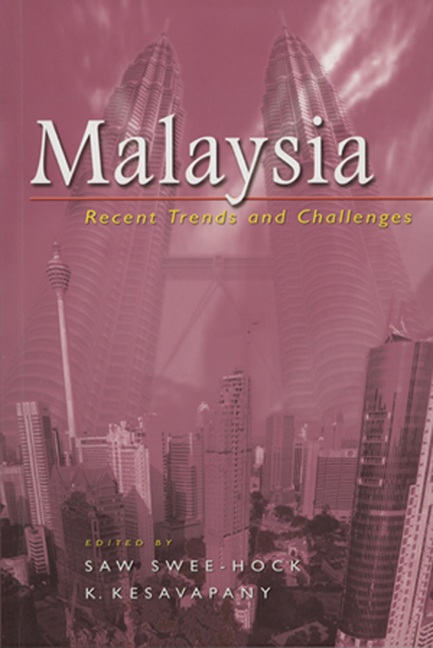Book contents
- Frontmatter
- Content
- Preface
- Foreword
- Contributors
- 1 Population Trends and Patterns in Multiracial Malaysia
- 2 The Emerging Politics of Islam Hadhari
- 3 Bangsa Malaysia: Vision or Spin?
- 4 The 2004 Malaysian General Elections: Economic Development, Electoral Trends, and the Decline of the Opposition
- 5 The UMNO-PAS Struggle: Analysis of PAS's Defeat in 2004
- 6 The Malay Electorate in 2004: Reversing the 1999 Result?
- 7 UMNO and BN in the 2004 Election: The Political Culture of Complex Identities
- 8 Malaysia's Civil Service Reform: Mahathir's Legacies and Abdullah's Challenges
- 9 Reinventing Governance in Corporate Malaysia: The Challenges Ahead
- 10 Globalisation and Ethnic Integration in Malaysian Education
- 11 Globalisation and the Challenges Facing Malaysia's Economy
- 12 Promising Start to Malaysia-Singapore Relations
- Bibliography
- Index
3 - Bangsa Malaysia: Vision or Spin?
Published online by Cambridge University Press: 21 October 2015
- Frontmatter
- Content
- Preface
- Foreword
- Contributors
- 1 Population Trends and Patterns in Multiracial Malaysia
- 2 The Emerging Politics of Islam Hadhari
- 3 Bangsa Malaysia: Vision or Spin?
- 4 The 2004 Malaysian General Elections: Economic Development, Electoral Trends, and the Decline of the Opposition
- 5 The UMNO-PAS Struggle: Analysis of PAS's Defeat in 2004
- 6 The Malay Electorate in 2004: Reversing the 1999 Result?
- 7 UMNO and BN in the 2004 Election: The Political Culture of Complex Identities
- 8 Malaysia's Civil Service Reform: Mahathir's Legacies and Abdullah's Challenges
- 9 Reinventing Governance in Corporate Malaysia: The Challenges Ahead
- 10 Globalisation and Ethnic Integration in Malaysian Education
- 11 Globalisation and the Challenges Facing Malaysia's Economy
- 12 Promising Start to Malaysia-Singapore Relations
- Bibliography
- Index
Summary
Slogans as Initiators of Discourse
Mahathir Mohamad was probably unwavering throughout his political life as far as his hopes for Malaysia were concerned. However, given the pragmatics of politics, one would expect the numerous slogans he forged over 22 years to direct the political focus of his countrymen to vary in efficacy, in seriousness, and in function. For them to rally the masses to directed discourse, these chosen phrases had to be loose yet suggestive. This form of policy promulgation characterised much of his image, and can be accredited for the impact his ideas had on the political consciousness of Malaysians.
Where economic policies were concerned, Mahathir's measures may have been varied, some working better than others, but the end he sought was always nationalistic. As noted by K.S. Jomo:
[O]n the whole, it can be said that economic policies from the early 1980s seek to transform Malaysia into a newly industrialized country (NIC) like South Korea, less dependent on the developed industrial nations, and under genuine Bumiputera capitalist entrepreneurial leadership. Most of Mahathir's economic policies seem to aim to achieve that end.
His policies were interestingly of a kind that needed to capture the imagination of the populace and pave the discursive path of the nation. For example, the Look East Policy announced in 1981 was an economic initiative insofar as it courted the governments and the businessmen of Japan and Korea to invest in Malaysia and in the process allow technical know-how to flow to Malaysia's advantage. At the same time, it was also very much a socio-cultural programme “wherein the Malaysian government itself seeks to inculcate a supposed Japanese work ethic through various propaganda devices and through concrete promotion and implementation of the policy in the private and public sectors”.
- Type
- Chapter
- Information
- MalaysiaRecent Trends and Challenges, pp. 47 - 72Publisher: ISEAS–Yusof Ishak InstitutePrint publication year: 2005

